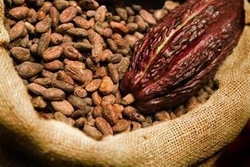
Cocoa and epicatechin (EC) have been suggested to exert beneficial effects in diabetes, but the mechanism for their insulin-like effects remains unknown. In this study, the modulation of insulin signaling by EC and a cocoa phenolic extract (CPE) on hepatic HepG2 cells was investigated by analyzing key proteins of the insulin pathways, namely insulin receptor, insulin receptor substrate (IRS) 1 and 2, PI3K/AKT and 5′-AMP-activated protein kinase (AMPK), as well as the levels of the glucose transporter GLUT-2 and the hepatic glucose production.
EC and CPE enhanced the tyrosine phosphorylation and total insulin receptor, IRS-1 and IRS-2 levels and activated the PI3K/AKT pathway and AMPK in HepG2 cells. CPE also enhanced the levels of GLUT-2. Interestingly, EC and CPE modulated the expression of phosphoenolpyruvate carboxykinase, a key protein involved in the gluconeogenesis, leading to a diminished glucose production. In addition, EC- and CPE-regulated hepatic gluconeogenesis was prevented by the blockage of AKT and AMPK.
The researchers said the data suggest that EC and CPE strengthen the insulin signaling by activating key proteins of that pathway and regulating glucose production through AKT and AMPK modulation in HepG2 cells.
A 2010 study conducted at Johns Hopkins University School of Medicine and published in the Journal of Cerebral Blood Flow and Metabolism found epicatechin may help protect the brain after a stroke by increasing cellular signals already known to shield nerve cells from damage.





